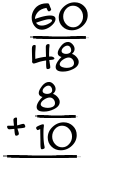What is 60/48 + 8/10?

|
Here's how to add
|
|||||||||||||||||||||||||||||||||||||||
Step 1Of course, you can't add two fractions if the denominators (bottom numbers) don't match. To get a common denominator, multiply the denominators together. Then we fix the numerators by multiplying each one by their other term's denominator. Now you multiply 60 by 10, and get 600, then we multiply 48 by 10 and get 480. Do the same for the second term. We multiply 8 by 48, and get 384, then multiply 48 by 10 and get 480. The problem now has new fractions to add:
|
|||||||||||||||||||||||||||||||||||||||
Step 2Since our denominators match, we can add the numerators. 600 + 384 = 984 The sum we get is
|
|||||||||||||||||||||||||||||||||||||||
Step 3The last step is to reduce the fraction if we can. To find out, we try dividing it by 2... Are both the numerator and the denominator evenly divisible by 2? Yes! So we reduce it:
Let's try dividing by that again... Are both the numerator and the denominator evenly divisible by 2? Yes! So we reduce it:
Let's try dividing by that again... Are both the numerator and the denominator evenly divisible by 2? Yes! So we reduce it:
Let's try dividing by that again... Nope! So now we try the next greatest prime number, 3... Are both the numerator and the denominator evenly divisible by 3? Yes! So we reduce it:
Let's try dividing by that again... Nope! So now we try the next greatest prime number, 5... Nope! So now we try the next greatest prime number, 7... Nope! So now we try the next greatest prime number, 11... Nope! So now we try the next greatest prime number, 13... Nope! So now we try the next greatest prime number, 17... Nope! So now we try the next greatest prime number, 19... Nope! So now we try the next greatest prime number, 23... No good. 23 is larger than 20. So we're done reducing. There you have it! Here's the final answer to 60/48 + 8/10
|